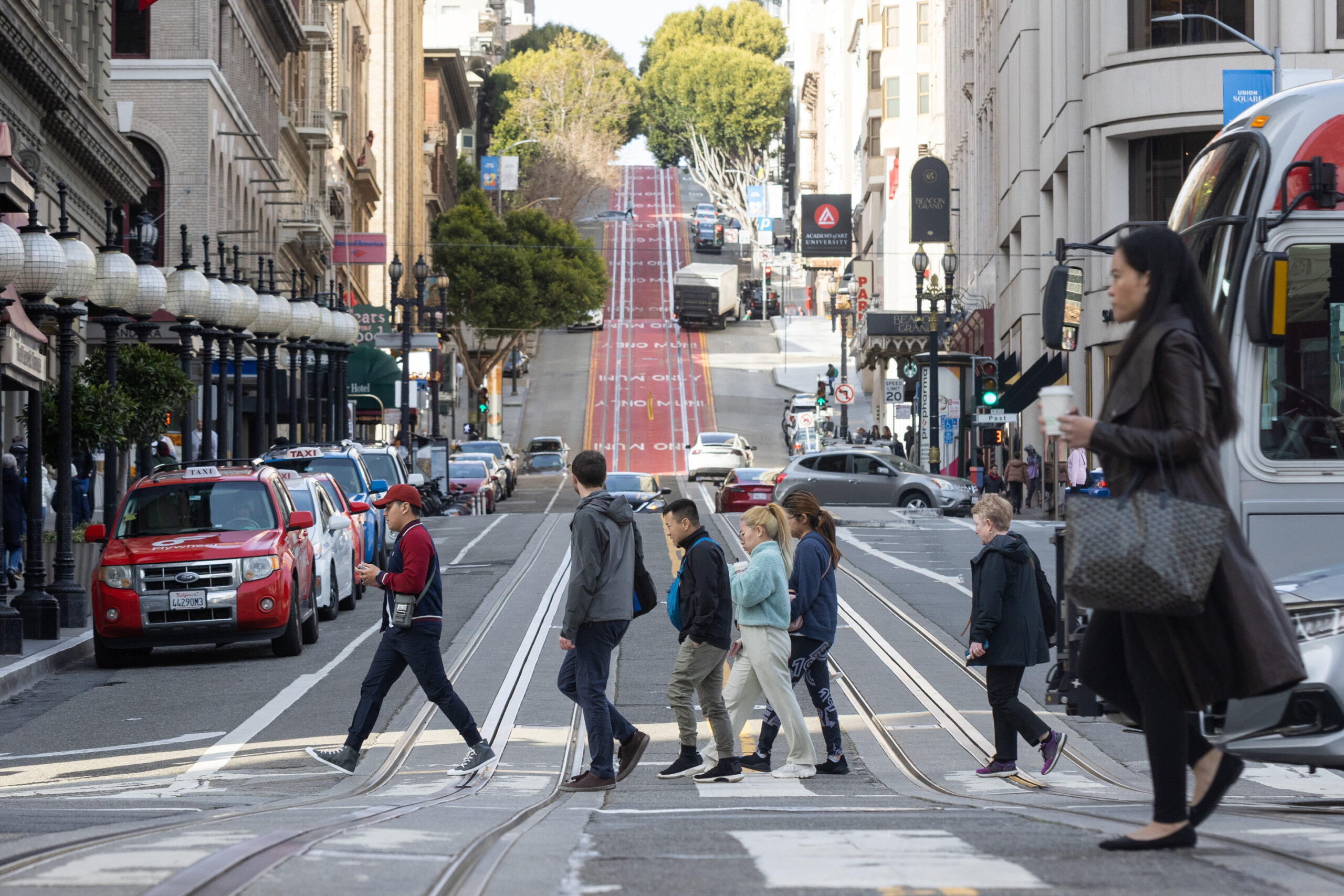In the three months since Mayor London Breed released her road map for Downtown San Francisco’s recovery, the barrage of negative headlines about the city’s central business district has continued.
Downtown has been dealing with an interconnected mix of issues including high office vacancy rates due to remote work, a growing number of small business closures because of a lack of foot traffic, as well as problems around street conditions and homelessness.
Public opinion polling has shown that San Francisco residents are increasingly fed up with the state of the city, in particular the sorry state of Downtown—which, prior to the pandemic, helped generate nearly half of the city’s sales tax revenue and virtually all of its business tax revenue.
According to newly released numbers from the annual CityBeat Poll from EMC Research sponsored by the San Francisco Chamber of Commerce, 76% of San Francisco voters say the city is heading down the wrong track, compared with 20% who say it’s going in the right direction.
To counter the narrative the city is sitting on its hands, the mayor provided a quarterly update on how the city aims to steer Downtown toward a broader economic recovery. But as officials head into a budget season highlighted by a $780 million deficit over the next two years, it’s clear that the fight to fully fund these programs will be contentious.
“We have to get uncomfortable with making those investments and getting to a better place,” Breed said at the AI Forward conference on Monday.
Breed’s own political future is likely tied to residents’ perceptions of the city. A recently released poll of 300 San Francisco voters sponsored by the San Francisco Deputy Sheriffs’ Association found a majority of respondents disapproved of the job she is doing as mayor and said she shouldn’t be reelected.
Public Safety
The number of people who named crime as a major issue ballooned from 26% in 2020 to 60% in 2023, according to the CityBeat Poll. While a vast majority (91%) of SF voters agreed that a thriving Downtown is critical to the city’s economy, only 64% said they feel safe visiting the area during the day and a mere 30% said the same at night.
Part of Breed’s answer to those concerns has been a boost in funding for police officers. She spearheaded a $25 million supplemental to increase the budget for police overtime over the objections of some supervisors.
Breed also introduced the extension of contracts with controversial nonprofit Urban Alchemy to deploy additional ambassadors for the Tenderloin and Mid-Market neighborhoods and with Block by Block for its welcome ambassador program in tourist hot spots.
Arts and Culture
Bringing in artists and creatives to the city’s Downtown core has been regularly positioned as a strategy to make the area more vibrant and attractive. Adding more restaurants and bars, entertainment and events Downtown all had wide support from voters, according to the CityBeat Poll.
The city has launched its Vacant to Vibrant program in partnership with nonprofit SF New Deal to open up short-term pop-up opportunities Downtown in vacant space with a potential pathway toward permanent locations. The first round of applicants is expected to be selected in June.
Although the city has not yet designated a promised Arts, Culture and Entertainment Zone, a number of new regular Downtown events have been launched including Bhangra & Beats Night Market and the Yerba Buena Art & Makers Market.
Business Taxes and Regulation
Among the ideas laid out in February were cutting red tape for small businesses that move Downtown, a three-year tax break for new businesses, a tax freeze for retail, hotels and other sectors—and an overhaul of the city’s tax codes.
Breed introduced new tax legislation along with Supervisors Matt Dorsey and Joel Engardio to delay some scheduled tax increases and offer new incentives. However, the Board of Supervisors Budget and Appropriations Committee is holding consideration of the measure until the mayor’s budget comes up for review.
City agencies have also been charged with analyzing various business tax reform measures with the idea of putting a ballot measure in front of voters in 2024. An assessment meant to study trends and growth potential in various industries is still in the works, with results expected in June.
Housing and Development
In April, Breed and the Department of Homelessness and Supportive Housing announced the Home by the Bay plan, which aims to cut unsheltered homelessness in half by 2028. But funding is again a barrier. In order to achieve its target, the department said it would require an additional $600 million.
There have also been more details on the mayor’s Housing for All plan, a series of strategies meant to accelerate the pace of housing development and meet the 82,000-unit goal laid out in San Francisco’s Housing Element.
Among them are new financing methods for megaprojects, changes to the permitting process for housing and a recent proposal from the mayor and Supervisor Myrna Melgar to raise density limits along commercial corridors in the city’s outer neighborhoods.
A wide-ranging piece of legislation from Breed and Supervisor Aaron Peskin would streamline the process of turning underused office buildings to housing, create more flexibility in retail-heavy Union Square, ease permitting for temporary pop-ups and open up the types of businesses that can go into ground floor spaces.
“The government of the city is a bureaucracy, and it sadly has so many layers that we always get in our own way,” Breed told The Standard Monday. “We have to start thinking bigger than just within our confined spaces of what’s possible.”
